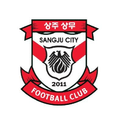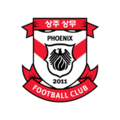Sangju Sangmu FC
 | |||
| Full name |
Sangju Sangmu Football Club 상주 상무 프로축구단 | ||
|---|---|---|---|
| Nickname(s) | Bulsajo (Phoenix) | ||
| Founded |
2011 as Sangju Sangmu Phoenix[1] 1984 as Sangmu FC (Original) | ||
| Ground | Sangju Civic Stadium | ||
| Capacity | 15,042 | ||
| Owner | Korea Armed Forces Athletic Corps | ||
| Chairman | Seong Baek-Young (mayor) | ||
| Manager | Cho Jin-ho | ||
| League | K League Classic | ||
| 2016 Season | 6nd | ||
| Website | Club home page | ||
|
| |||
| Korea Armed Forces Athletic Corps |
|---|
|
Sangju Sangmu FC (Korean: 상주 상무 프로축구단), is a professional football club that plays in the K League Classic. The club is based in Sangju, South Korea. Sangmu (상무, 尙武) means martialism and is the sports division of the Military of South Korea The club officially removed the word "Phoenix" in its name since 2013. The Sangmu means martialism and club's mascot is the Bulsajo, which translates to "Phoenix" in English. The club's hometown was moved from Gwangju to Sangju, Gyeongsangbuk-do after Gwangju founded the new professional club Gwangju FC in 2011.
History
Origin – Army FC, Navy FC, Air Force FC era (?–1983)
There were ROK Army FC, ROK Navy FC, ROK Air Force FC until 1983 in Korea. ROK Marine Corps FC became ROK Navy FC in 1973. The 3 military football clubs were consolidated into one, football side of Korea Armed Forces Athletic Corps in January 1984.
Founding and Sangmu Semi-professional FC era (1984–2002)
Sangmu FC was founded on 11 January 1984, as the football side of Korea Armed Forces Athletic Corps.[2][3] Although Sangmu squad was composed of professional players from K-League club, Sangmu FC competed in the Semi-professional league (present Korea National League). In 1985 Sangmu joined the K-League for the 1985 season, but spent only one year in the league before dropping out.
Sangmu's playing staff is made up of young Korean professional footballers serving their compulsory two-year military duty. Fifteen players join up at the start of every season and spend two years with the side before returning to their previous professional club. Sangmu are not allowed to sign any foreign players because of their military status. The military nature of the club means that the overwhelming majority of the players are in their early 20s, and thus lack the playing experience of the opponents. As a consequence, the club has historically been underachievers in the K-League.
The reserve side, Sangmu B, competed in the K2 League from 2003 to 2005 before joining the K-League reserve league. It finished runners-up in the 2003 K2 League season, and was based in Icheon for the three years it competed at K2 level.
Gwangju Sangmu FC era (2003–2010)
After establishing a home base in Gwangju, the club rejoined the K-League at the start of the 2003 season as Gwangju Sangmu Bulsajo. Since 2004, the club has been known as Gwangju Sangmu FC.
Sangju Sangmu FC era (2011–present)
Once Gwangju FC was established, Gwangju Sangmu FC moved to Sangju, Gyeongsangbuk-do, as Korea Armed Forces Athletic Corps moved to Mungyeong, near Sangju. The club name was officially changed to Sangju Sangmu Phoenix FC in January 2010.[4] Since the 2011 season, the club has participated as Sangju Sangmu Phoenix FC.[5]
After winning the inaugural season of the 2013 K-League Challenge and winning the first ever K-League promotion-relegation playoffs against Gangwon FC, who finished third from the bottom of the 2013 K-League Classic, Sangju Sangmu was promoted to the South Korea's top-tier league.[6][7]
Honours
Domestic competitions
League
Professional
Semi-professional
-
 Winners (9): 1984, 1991 Fall, 1992 Spring, 1994 Spring, 1996 Fall, 1997 Fall, 1998 Fall, 1999 Fall, 2002 Spring
Winners (9): 1984, 1991 Fall, 1992 Spring, 1994 Spring, 1996 Fall, 1997 Fall, 1998 Fall, 1999 Fall, 2002 Spring -
 Runners-up (5): 1987 Fall, 1993 Spring, 1999 Spring, 2000 Spring, 2003
Runners-up (5): 1987 Fall, 1993 Spring, 1999 Spring, 2000 Spring, 2003
Cups
Professional
-
 Winners (1): 1996
Winners (1): 1996
Semi-professional
-
 Winners (1): 1984
Winners (1): 1984
Records
| Season | Division | Tms. | Pos. | FA Cup |
|---|---|---|---|---|
| 1985 | 1 | 8 | 6 | – |
| 1996 | Semi-professional Era | Round of 16 | ||
| 1997 | 1st Round | |||
| 1998 | Round of 16 | |||
| 1999 | Quarter-final | |||
| 2000 | Round of 16 | |||
| 2001 | Round of 16 | |||
| 2002 | Round of 16 | |||
| 2003 | 1 | 12 | 10 | Round of 16 |
| 2004 | 1 | 13 | 8 | Quarter-final |
| 2005 | 1 | 13 | 13 | Round of 16 |
| 2006 | 1 | 14 | 14 | Round of 16 |
| 2007 | 1 | 14 | 14 | Round of 16 |
| 2008 | 1 | 14 | 14 | Quarter-final |
| 2009 | 1 | 15 | 11 | Round of 16 |
| 2010 | 1 | 15 | 14 | Quarter-final |
| 2011 | 1 | 16 | 14 | Round of 16 |
| 2012 | 1 | 16 | 16 | Round of 16 |
| 2013 | 2 | 8 | 1 | Round of 16 |
| 2014 | 1 | 12 | 12 | Semi-final |
| 2015 | 2 | 11 | 1 | 3rd Round |
- Key
- Tms. = Number of teams
- Pos. = Position in league
Players
Current squad
- As of 15 September 2016
Note: Flags indicate national team as defined under FIFA eligibility rules. Players may hold more than one non-FIFA nationality.
|
|
Managers
| # | Name | From | To | Season | Notes |
|---|---|---|---|---|---|
| |
1984/01/11 | 1984/??/?? | 1984 (Semi-professional) | ||
| |
1985/??/?? | 1985/07/09 | 1985 | ||
| |
1985/07/10 | 1989/12/?? | 1985 1986–1989 (Semi-professional) |
||
| |
1990/??/?? | 2010/10/27 | 1990–2002 (Semi-professional) 2003–2010 |
||
| 1 | |
2010/10/28 | 2011/07/13 | 2010–2011 | |
| C | |
2011/07/14 | 2011/12/29 | 2011 | |
| 2 | |
2011/12/30 | 2015/12/11 | 2012–2015 | |
| 3 | |
2015/12/18 | present | 2016–present |
Season record
K League
| Gwangju Sangmu | |||||||||||||
|---|---|---|---|---|---|---|---|---|---|---|---|---|---|
| Season | Teams | P | W | D | L | GF | GA | GD | Pts | Position | Korean FA Cup | League Cup | Top scorer (League goals) |
| 1985 | 8 | 21 | 6 | 7 | 8 | 23 | 30 | −7 | 19 | 6th | None | None | |
| 2003 | 12 | 44 | 13 | 7 | 24 | 41 | 60 | −19 | 46 | 10th | Round of 16 | None | |
| 2004 | 13 | 24 | 6 | 11 | 7 | 18 | 20 | −2 | 29 | 8th | Quarter-finals | 10th | |
| 2005 | 13 | 24 | 4 | 5 | 15 | 23 | 38 | −15 | 17 | 13th | Round of 16 | 11th | |
| 2006 | 14 | 26 | 5 | 8 | 13 | 17 | 29 | −12 | 23 | 14th | Round of 16 | 11th | |
| 2007 | 14 | 26 | 2 | 6 | 18 | 14 | 44 | −30 | 12 | 14th | Round of 16 | Group stage | |
| 2008 | 14 | 26 | 3 | 7 | 16 | 22 | 46 | −24 | 16 | 14th | Quarter-finals | Group stage | |
| 2009 | 15 | 28 | 9 | 3 | 16 | 33 | 40 | −7 | 30 | 11th | Round of 16 | Group stage | |
| 2010 | 15 | 28 | 3 | 10 | 15 | 17 | 43 | −26 | 19 | 14th | Quarter-finals | Group stage | |
| Sangju Sangmu Phoenix | |||||||||||||
| 2011 | 16 | 30 | 7 | 8 | 15 | 36 | 53 | −17 | 29 | 14th | Round of 16 | Group stage | |
R League
| Gwangju Sangmu Reserves | |||||||||||||
|---|---|---|---|---|---|---|---|---|---|---|---|---|---|
| Season | Stage | Teams | P | W | D | L | GF | GA | GD | Pts | Position | Top scorer (League goals) | |
| 2002 | South Group | 5 | 16 | 7 | 7 | 2 | 33 | 18 | +15 | 28 | 1st | ||
| Playoff | 4 | 1 | 0 | 0 | 1 | 0 | 1 | −1 | 0 | Semi-finals | |||
| 2006 | Group A | 4 | 18 | 6 | 4 | 8 | 23 | 26 | −3 | 22 | 4th | ||
| 2007 | Group B | 4 | 18 | 7 | 4 | 7 | 28 | 25 | +3 | 25 | 3rd | ||
| 2008 | Group B | 8 | 21 | 9 | 4 | 8 | 29 | 29 | 0 | 31 | 6th | ||
| 2009 | Group B | 4 | 12 | 5 | 3 | 4 | 20 | 15 | +5 | 18 | 2nd | ||
| 2010 | Group B | 8 | 14 | 6 | 2 | 6 | 23 | 24 | −1 | 20 | 4th | ||
| Sangju Sangmu Phoenix Reserves | |||||||||||||
| 2011 | Group B | 8 | 21 | 11 | 4 | 6 | 33 | 32 | +1 | 37 | 1st | ||
Korea National League
| Icheon Sangmu | |||||||||||||
|---|---|---|---|---|---|---|---|---|---|---|---|---|---|
| Season | Stage | Teams | P | W | D | L | GF | GA | GD | Pts | Position | League Cup | Top scorer (League goals) |
| 2003 | First Stage | 10 | 9 | 4 | 2 | 3 | 15 | 13 | +2 | 14 | 4th | None | |
| Second Stage | 10 | 9 | 5 | 4 | 0 | 18 | 9 | +9 | 19 | 1st | |||
| Playoff | 2 | 2 | 0 | 1 | 1 | 4 | 5 | −1 | 1 | Runner-up | |||
| 2004 | First Stage | 10 | 9 | 6 | 1 | 2 | 12 | 9 | +3 | 19 | 3rd | Group stage | |
| Second Stage | 10 | 9 | 2 | 4 | 3 | 11 | 12 | −1 | 10 | 6th | |||
| 2005 | First Stage | 11 | 10 | 4 | 3 | 3 | 11 | 8 | +3 | 15 | 6th | Semi-finals | |
| Second Stage | 11 | 10 | 5 | 3 | 2 | 11 | 6 | +5 | 18 | 2nd | |||
Crests

1985 Sangmu FC 
2003 Gwangju Sangmu Bulsajo 
2004–2010 Gwangju Sangmu 
2011–2012 Sangju Sangmu Phoenix
(Unveiled : 2011-02-26)
2013–present Sangju Sangmu
(Unveiled : 2013-01-??)
Kit Supplier
See also
Footnotes
- ↑ Records include results from the Korean National Semi-Professional Football League (Korean League, 1964~2002) and the Korea National League (National League, 2003~present). The Korean League, albeit semi-professional, was the top tier of Korean football until the commencement of professional football in 1983. In 2003, the Korean League was officially rebranded and launched as the National League. The National League inherited its predecessor's role as the highest tier of semi-professional football in Korea. Upon the formation of K League Challenge as the second tier league of Korean football in 2013, the National League then became the third tier league of Korean football.
References
- ↑ Official Club Profile at K League Website (Korean)
- ↑ 군경기단체 국군체육부대로 통합 팀 명칭 상무, 마스코트는 불사조로 (in Korean). Dong-a Ilbo. 1984-01-11.
- ↑ 육,해,공 3군통합 스포츠팀 상무 창단 (in Korean). Maeil Business Newspaper. 1984-01-12.
- ↑ 상주상무피닉스축구단 운영방침 및 사업계획 (in Korean). Sangju City Hall. 2011-01-10.
- ↑ ""경북 상주로" 상무, 연고지 변경해 내년 K리그 참가" (in Korean). The Daily Sports Seoul. 2010-12-10.
- ↑ "K리그 챌린지 초대 우승팀 상주 우승 트로피 수상" (in Korean). Sportal Korea. 2013-11-17.
- ↑ 강제강등에서 첫 승격까지, 역사가 된 상주상무 (in Korean). MK Sports. 2013-12-07.
External links
| Wikimedia Commons has media related to Sangju Sangmu. |
- Official website (Korean)